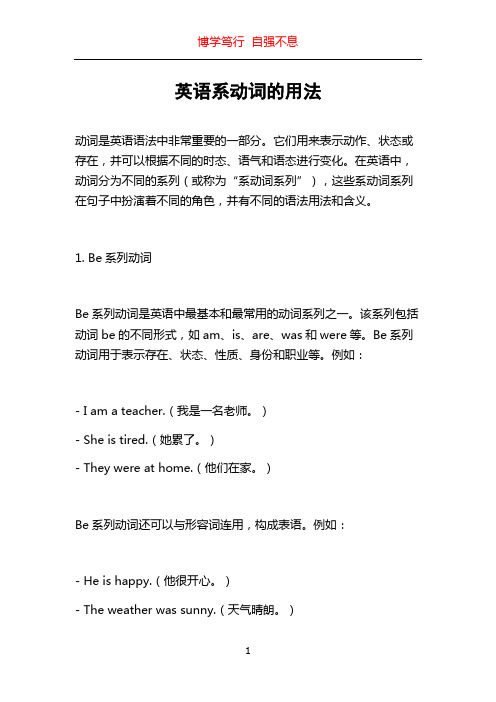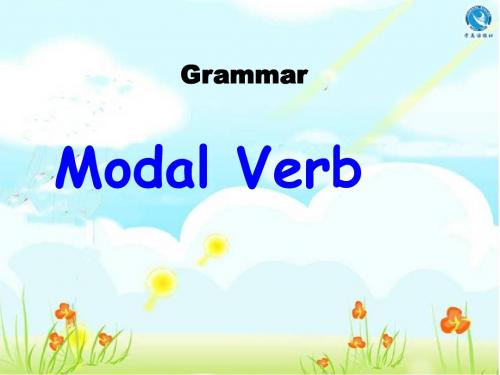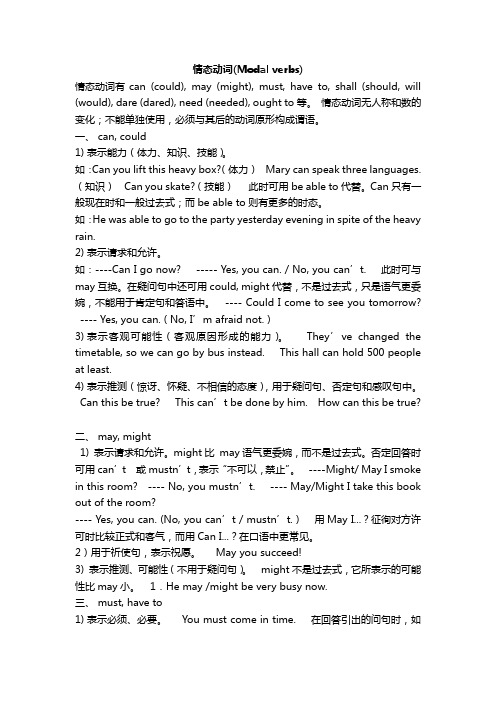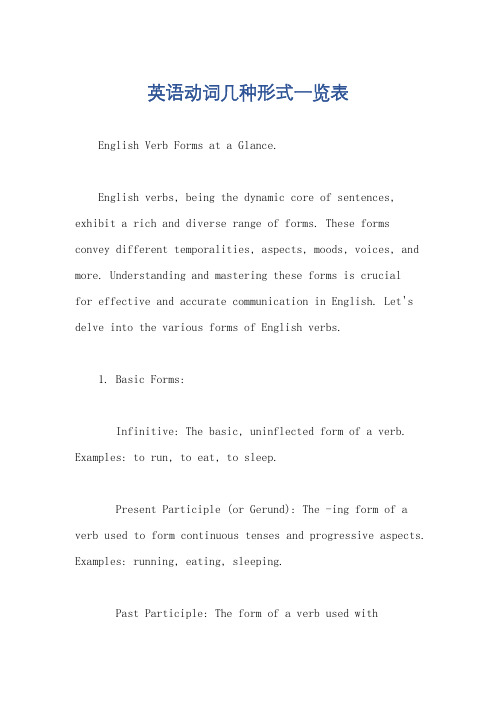English Modal Verbs
一定做某事的英文短语

一定做某事的英文短语A Comprehensive Guide to Expressing "Must Do" in English.In English, the concept of "must do" can be conveyed through a variety of grammatical structures and vocabulary choices. Here is a comprehensive guide to help you express this idea effectively:1. Modal Verbs:a) Must: The most direct way to express "must do" is to use the modal verb "must." This indicates that an action is necessary or obligatory. For example:You must finish this project by tomorrow.Students must attend all classes.b) Have to: "Have to" is another common way to expressobligation. It is often interchangeable with "must," but it can also imply a sense of external pressure or compulsion. For example:I have to go to work today.We have to pay our taxes by April 15th.2. Auxiliary Verbs:a) Should: "Should" can indicate a strong recommendation or moral obligation. It often implies that an action is advisable or expected. For example:You should see a doctor if you're not feeling well.Children should respect their parents.b) Ought to: "Ought to" is similar to "should," but it typically conveys a stronger sense of obligation. It is often used in formal or academic contexts. For example:We ought to reduce our carbon footprint.Scholars ought to be honest in their research.3. Other Structures:a) It is necessary to: This phrase emphasizes the necessity or importance of an action. For example:It is necessary to wear a helmet when riding a bike.It is necessary to study hard for exams.b) One must: This expression is often used in formal or literary contexts. It conveys a strong obligation or compulsion. For example:One must always strive for excellence.One must respect the authority of the law.c) Have got to: This informal phrase implies a urgentor unavoidable obligation. It is often used in colloquial speech. For example:I've got to finish this essay tonight.We've got to leave for the airport now.4. Vocabulary Choices:a) Essential: This adjective describes something that is absolutely necessary or indispensable. For example:Water is essential for life.It is essential to have a good education.b) Vital: "Vital" is similar to "essential," but it often implies a matter of life or death. For example:Oxygen is vital for human survival.It is vital to seek medical attention in case of anemergency.c) Imperative: This adjective emphasizes the urgency or importance of an action. For example:It is imperative to follow traffic laws.It is imperative that we protect our environment.5. Expressions of Permission and Prohibition:a) Must not: This expression indicates that an action is prohibited or forbidden. It is the negative form of "must." For example:You must not smoke in the library.Students must not use their cell phones in class.b) Have to: "Have to" can also be used to express permission, especially in questions or polite requests. For example:Do I have to show my ID?May I have to use your bathroom?Choosing the Right Expression:The best way to express "must do" in English depends on the specific context and the desired tone or emphasis. Here are some general guidelines:Strong Obligation: Use "must" or "have to."Recommendation or Advice: Use "should" or "ought to."Importance or Necessity: Use "it is necessary to" or "one must."Urgent or Unavoidable Obligation: Use "have got to."Prohibition: Use "must not."Remember, the effective use of "must do" expressions requires not only grammatical accuracy but also asensitivity to cultural nuances and the intended audience. By mastering these structures and vocabulary choices, you can confidently convey the concept of obligation in English.。
英语系动词的用法

英语系动词的用法动词是英语语法中非常重要的一部分。
它们用来表示动作、状态或存在,并可以根据不同的时态、语气和语态进行变化。
在英语中,动词分为不同的系列(或称为“系动词系列”),这些系动词系列在句子中扮演着不同的角色,并有不同的语法用法和含义。
1. Be系列动词Be系列动词是英语中最基本和最常用的动词系列之一。
该系列包括动词be的不同形式,如am、is、are、was和were等。
Be系列动词用于表示存在、状态、性质、身份和职业等。
例如:- I am a teacher.(我是一名老师。
)- She is tired.(她累了。
)- They were at home.(他们在家。
)Be系列动词还可以与形容词连用,构成表语。
例如:- He is happy.(他很开心。
)- The weather was sunny.(天气晴朗。
)在进行时态中,be系列动词也是不可或缺的。
例如:- They are studying for the exam.(他们正在为考试学习。
)- I was sleeping when you called.(你打电话时我正在睡觉。
)2. Have系列动词Have系列动词主要包括have的不同形式,如has、had等。
Have系列动词用于表示拥有、经历、关系和行为等。
例如:- She has a cat.(她有一只猫。
)- They had dinner together.(他们一起吃饭。
)- We have known each other for years.(我们认识多年了。
)Have系列动词还可以与名词连用,表示特定的行为或状态。
例如:- He had a shower.(他洗了个澡。
)- We have a meeting tomorrow.(我们明天有个会议。
)在完成时态中,have系列动词用于构成完成时态。
例如:- She has finished her homework.(她完成了作业。
MODAL VERBS(情态动词)复习讲稿

MODAL VERBS(情态动词)复习讲稿●情态动词的特点:1.没有人称和数的变化。
2. 有些情态动词有过去式的变化:e.g. will → would , can → could , may→ might ,dare → dared●情态动词的否定式: 情态动词+ not +动词原形can not: can't , must not:mustn't , need not : needn't●情态动词的用法及相互区别, 是考试的内容之一。
1. can , be able to be able to 表示经过努力后, 能够做到; be able to 有多种形式的变化。
can 1). 表示体力或脑力方面的能力; 2). 表示允许、可能性。
could 是can的过去式, 表示过去有能力及过去存在的可能性 ; 用于疑问句表示委婉地提出问题。
1). The fire spread through the hotel very quickly but everyone ____ get out. (NMET 97 )A. had toB. wouldC. couldD. was able to 2). She asked if she could keep the book for another two days.3). -Will you stay for lunch?-Sorry, __ . My brother is coming to see me. (NMET99)A. I mustn'tB. I can'tC. I needn'tD. I won't2.may 表示询问或说明一件事可不可做 ; 表示某事有可能发生。
might 是may的过去式; 用在疑问中比may委婉、客气。
1). -May I take this book out of the reading-room?-No, you mustn't. ( Yes, you may.)2). -Might I make a suggestion? -Yes, you may.3. must 1). 表示必须要做的事: 必须2). 表示很有把握的推断: 一定, 准是。
modal verb(情态动词)

Modal Verb
什么是情态动词? (Modal Verbs) 情态动词表示说话人的某种 感情或语气,对某一动作 或状态的某种态度。 表示“需要、可以、 必须、应当”等。
情态动词的语法特征
1. 情态动词不能单独做谓语,除ought 和have外,后面只能接不带to的不定式。 2. 情态动词没有人称,数的变化,但有 些情态动词,如can, will也有一般式 和过去式的变化。
may 常用来表示: A. 表示请求、允许: B. 表示说话人的猜测: “也许” “可 能”: 通常只用于肯定句和否定句中。
C. 表示祝愿; 但语气较正式: might 的用法有: 多在间接引语中表示过去的可能和允 许。如: She said that he might take her bike. 她说他可以拿她的自行车去用。
表示现在的许可,语气比may 较委婉,
一般用于疑问句(包括间接疑问句),
不可用于肯定句或者否定句。
如: Might I have a word with you?
我可以和你说句话吗?
will和would
1. will是助动词还是情态动词?
will用于构成将来时是助动词。
用于表示“意志”“决心”“请求”是
2. 表示否定的情态动词的用法:
部分情态动词的否定式是情态动词中的 考点之一。 mustn’t 不准; 禁止 needn’t 没必要 ( = don’t have to ) can’t 不能; 不可能 may not 不可以; 可能不 shouldn’t 不应该 ( = ought not to )
表示主语的义务或责任: You should take care of your sister. 你应当去照顾你妹妹。 或指出一个正确、明智的动作: They shouldn't allow parking here; the street is too narrow. 这儿不该允许停车;马路太窄了。
M3-AC14-grammar-情态动词--modal-verbs

情态动词(Modal verbs)情态动词有can (could), may (might), must, have to, shall (should, will (would), dare (dared), need (needed), ought to等。
情态动词无人称和数的变化;不能单独使用,必须与其后的动词原形构成谓语。
一、can, could1)表示能力(体力、知识、技能)。
如:Can you lift this heavy box?(体力)Mary can speak three languages.(知识)Can you skate?(技能)此时可用be able to代替。
Can只有一般现在时和一般过去式;而be able to则有更多的时态。
如:He was able to go to the party yesterday evening in spite of the heavy rain.2)表示请求和允许。
如:----Can I go now? ----- Yes, you can. / No, you can’t. 此时可与may互换。
在疑问句中还可用could, might代替,不是过去式,只是语气更委婉,不能用于肯定句和答语中。
---- Could I come to see you tomorrow? ---- Yes, you can. ( No, I’m afraid not. )3)表示客观可能性(客观原因形成的能力)。
They’ve changed the timetable, so we can go by bus instead. This hall can hold 500 people at least.4)表示推测(惊讶、怀疑、不相信的态度),用于疑问句、否定句和感叹句中。
Can this be true? This can’t be done by him. How can this be true?二、may, might1) 表示请求和允许。
modal verbs 英语解释

modal verbs 英语解释Modal verbs are a category of English verbs that are used to express possibility, necessity, permission, ability, and other similar ideas. They are unique in the sense that they do not have a specific tense and do not change form depending on the subject of the sentence. Instead, they are followed by the base form of another verb to complete the sentence.There are ten modal verbs in English: can, could, may, might, shall, should, will, would, must, and ought to. Each of these modal verbs has its own specific uses and meanings, but they all serve to modify the meaning of the main verb in a sentence. Modal verbs can also be used to express different degrees of certainty or obligation, depending on the context.One common use of modal verbs is to express ability or possibility. For example, "I can swim" or "It may rain later." In these examples, "can" and "may" are used to indicate the ability to swim and the possibility of rain, respectively.Modal verbs are also often used to express permission or obligation. For example, "You must wear a helmet" or "You may leave early if you finish your work." In these examples, "must"indicates a strong obligation to wear a helmet, while "may" grants permission to leave early under certain conditions.Modal verbs can also be used to make requests, suggestions, or offer advice. For example, "Could you help me with my homework?" or "You should get some rest." In these examples, "could" is used to make a polite request, while "should" is used to offer advice.It is important to note that modal verbs do not change form depending on the subject of the sentence, and they are always followed by the base form of another verb. For example, "She can swim" and "They can swim" have the same form of the modal verb "can," and both are followed by the base form "swim."In conclusion, modal verbs are a versatile and important part of the English language that are used to express a wide range of meanings and functions. They play a crucial role in shaping the tone and meaning of a sentence, and can convey nuances of certainty, possibility, obligation, and more. Understanding how to use modal verbs correctly can help improve your English language skills and make your communication more precise and effective.。
英语动词几种形式一览表

英语动词几种形式一览表English Verb Forms at a Glance.English verbs, being the dynamic core of sentences, exhibit a rich and diverse range of forms. These forms convey different temporalities, aspects, moods, voices, and more. Understanding and mastering these forms is crucialfor effective and accurate communication in English. Let's delve into the various forms of English verbs.1. Basic Forms:Infinitive: The basic, uninflected form of a verb. Examples: to run, to eat, to sleep.Present Participle (or Gerund): The -ing form of a verb used to form continuous tenses and progressive aspects. Examples: running, eating, sleeping.Past Participle: The form of a verb used withauxiliary verbs to form perfect tenses and passive voices. Examples: run, eaten, slept.2. Tenses:Present Tense:+ Simple Present: I run, you run, he/she/it runs, we run, they run.+ Present Continuous (or Progressive): I am running, you are running, he/she/it is running, we are running, they are running.Past Tense:+ Simple Past: I ran, you ran, he/she/it ran, we ran, they ran.+ Past Continuous (or Progressive): I was running, you were running, he/she/it was running, we were running, they were running.+ Past Perfect: I had run, you had run, he/she/it had run, we had run, they had run.+ Past Perfect Continuous (or Progressive): I had been running, you had been running, he/she/it had been running, we had been running, they had been running.Future Tense:+ Simple Future: I will run, you will run,he/she/it will run, we will run, they will run.+ Future Continuous (or Progressive): I will be running, you will be running, he/she/it will be running, we will be running, they will be running.+ Future Perfect: I will have run, you will have run, he/she/it will have run, we will have run, they will have run.+ Future Perfect Continuous (or Progressive): Iwill have been running, you will have been running,he/she/it will have been running, we will have been running, they will have been running.3. Aspects:Progressive Aspect: Expresses ongoing or habitual actions. Forms are similar to the present and past continuous tenses.Perfect Aspect: Expresses actions that have been completed at a specific point in time or have been ongoing up to that point. Forms are similar to the present perfect, past perfect, future perfect, and their continuous variants.4. Voices:Active Voice: The subject performs the actiondenoted by the verb. E.g., She wrote a book.Passive Voice: The action denoted by the Verb is performed on the subject. E.g., A book was written by her.5. Modal Verbs:Modal verbs express modality, which is the speaker's attitude or judgment towards the truth or likelihood of the statement made. Common modal verbs include: can, could, may, might, must, shall, should, will, would, ought to, need, dare.Example: I must finish my homework tonight.6. Phonological Variants:Some verbs have different pronunciations depending on their form or function. For instance, the past tense of "read" is pronounced /red/ while the present participle is pronounced /riːdɪŋ/.7. Irregular Verbs:Not all verbs follow the regular patterns of formation. Irregular verbs have unique forms for the past tense, pastparticiple, or both. Examples include: go went gone, see saw seen, eat ate eaten.In conclusion, English verbs are incredibly versatile and their forms reflect the complexity and nuances of the language. Mastering these forms is essential for effective communication and for expressing ideas precisely. With practice and dedication, one can master the art of verb formation in English.。
modal verbs

11. 表邀请: Will/ Would you (please) sing us a song?. 12. 表请求:Can/ Could you tell me how to get to the railway station? 13. 最好,表建议或劝告:had better 14. 过去常常: used to, would 15. 宁愿:: must, should, ought to 7. 表可能的推测: may/ might (might 表不肯定) can/ could 表肯定的推测: must 表肯定不可能: can't 表可能不: may not/ might not
询问可能性: can/ could(疑问句句中常用) 8. 征求对方意见: Shall I see you off at the station? 9. 提出建议: 10. 表意愿: Shall we go there by taxi? will/ would,shall(第一人称)
used to 和 would 1. used to 侧重于强调过去与现在的对照 . We used to have a cold bath in winter, but we don't now. 2. would 常含有表示过去的从句 . The old teacher would tell us fair tales when he had time. 3. 表示过去的状态和心理活动多与 表示过去的状态和心理活动多与used to 连用 . There use to be fish in the river. . People use to believe that the moon had its own light.
1. 表能力:
- 1、下载文档前请自行甄别文档内容的完整性,平台不提供额外的编辑、内容补充、找答案等附加服务。
- 2、"仅部分预览"的文档,不可在线预览部分如存在完整性等问题,可反馈申请退款(可完整预览的文档不适用该条件!)。
- 3、如文档侵犯您的权益,请联系客服反馈,我们会尽快为您处理(人工客服工作时间:9:00-18:30)。
2. Can不能用于表示将来才具备的一般能力
例如,我们不说: *I can speak English well in two years. (×) 应改为:I will be able to speak English well in two years. *You can swim soon if you practise every day. (×) 应改为:You will be able to swim soon if you practise every day.
但是,can可以表示现在断定将来能办到的 具体事情。例如: Now I am busy. I can repair your car this afternoon. be able to 可用于不同的时态。例如: He is / was / will be able to talk to foreigners in English.
4.can not, may not, must not 表示 “不许 可”。
may not 较为正式,must not 语气最强。 前两者也可表示猜测,有时会有歧义。例 如:
Jack may not attend the meeting.
1. 杰克不可以参加会议?(许可)
2。杰克可能不参加会? (可能)
3.推测的三种 “体”:
一般体: 情态动词+(无to)动词原形 进行体: 情态动词+ be+现在分词(即v-ing) 完成体: 情态动词+ have +过去分词(即v-ed)
一般体表示通常情况: He may know you. That man can’t work in our school. 进行体表示“正在发生的情况”: They may be waiting for us. Could they be talking about my new skirt? 完成体表示“已经发生了的情况” It must have rained last night.
I.Ability (能力): can, be able to 1. Can 表示现有的,一般的能力,包括体 能、智能、技能。通常可以用be able to 替换。例如: Can you stand on your hands? Are you able to stand on your hands? 但表示正在发生的动作只能用can, 而 不用be able to。如: Look! I can stand on my hands.
VII. Others
1.Dare(敢) (dared) 用于否定和疑问 Dare you swim across the river? =Do you dare to swim across the river? He dare not tell it to his father. 2.Need(需求)用于否定和疑问(没有过去式) We needn’t have a rest. We can go on. Need you find a new house
3. Could 表示过去的一般能力;was able to 表示过去的能力, 同时又表示这一能力得 以实现。 He could / was able to walk when he was 8 months old. He could swim across the river easily, but he didn't. He was able to swim across the river.(= He succeeded in swimming across the river.)
could / couldn’t)
3.表示过去的“许可”。
极少用might He might not go there.实际上经常表示“他可能 不 去那儿。” could可以表示过去的许可,但一般有过去时 间状语。例如: This castle could be visited those days. 或用其他手段: We were not allowed to smoke when at school.
2.could和might表推测不指过去,只是语 气委婉。
He can’t / couldn’t be interested in such books. The story may / might interest the children.
对过去情况的推测要用“情态动词+完成 体”
Billy may / might have returned to London yesterday.
3. Shall (许诺)
I shall see you tomorrow. I shan’t be late.
4. used to (半助动词)(两种否定式和疑问式)
I used to smoke a lot. He used to live here, usedn’t he / didn’t he? Did you used / Used you to lie to the teacher?
XIII.与过去事实相反
1. 本来应该/ 本来能够 / 本来会 / 本来可以
should / could would / might
+ have done
本句型用于表示“责备,懊悔,解释” 等。通常暗含由于意外而致使这一情 况未能发生。
We should have watered the flower. I could have caught the thief (if he had not got in the taxi) I wouldn’t have come so early if I hadn’t made a mistake about the time You might have used my car. I never thought Jack would lend it to his friend.
5. shall not,shan’t, will not, won’t同义, 表示说话人有权禁止。
You shan’t get away with it. It’s mine. *现在主要用于规章制度中。
III. Request(请求帮助)
would, will, can, could可与 you 连用, 以提出请求。Would 和could更为客气。 --- Would / Could you please open the door for me? --- Yes, of course (I will). / I’m afraid I can’t (at the moment).
3. Shall I / he…? (要我 / 他…吗?)
Shall I get / fetch you some drink? Shall he wait in the living room or come to see you now?
在这类句式中,听话人有支配权。
V. Obligation (义务)
English Modal Verbs (英语情态动词)
(根据语用功能分类)
The functions of the modal verbs (情态动词的功能)
能力(ability): can, be able to 许可(permission): may, can; might, could,(must not) 请求(request) : can, will, could, would 提议/提供(offering): would, can, may, shall 义务(obligation): should, ought to, must, need 可能(possibility): may, might, can, could, must, ought to, should; will 意愿(intention):will, would 其它(others): dare(敢), need(需要), shall(许诺) 与过去事实相反: would, could, should, might, need
① 强制性义务 1.must用于提问和肯定。
Everyone must obey the rules. Must I pay for that?
2.have to 用于各种句式。往往有客观上只能如 此之义。
We have to finish the work first. You will have to hand out those papers.
② 劝说性义务
1. ought to和should可用于各种句式。
You ought to do some housework for your parents. We should study hard.
2. 否定疑问更显礼貌。 Oughtn’t we to phone the police?
③ 中性的need
注:need表示“需求”,见VII.Others
VI. possibility (可能性)
1. can用于疑问和否定。may用于肯定和否 定,must用于肯定。 Can that man be a doctor? No, he can’t be a doctor. Tom’s mother may not be at home. Jack may like your gift. That man must be very stupid.
II.Permission (允许)
1.may, can, might, could表示“许可”, 均可用于疑问句, 以请求得到许可(ask for permission)。例如: Can / Could / May / Might I use your telephone? could和might的语气比较委婉,显得 彬彬有礼。
